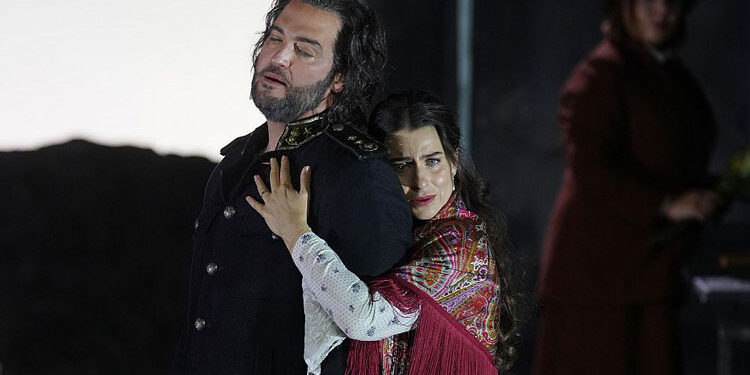On Friday 19 September, the Teatro Real opens its new season, the 29th since its reopening, with the re-release of the production of Otello by Giuseppe Verdi, premiered in 2016, in a co-production with the English National Opera and the Royal Stockholm Opera. Tickets can be purchased at this link. (Photo: Javier del Real).
This masterpiece of the lyrical repertoire was born thanks to the insistence and perseverance of the great editor Giulio Ricordi (1840-1912), who over the course of several years persuaded Verdi, already discreetly retired, to resume operatic creation, which the composer had abandoned after the premiere of Aida in 1871, when the growing influence of Wagner and the emergence of verismo were alienating him from the Italian musical world.
Finally, it was the rapturous dramatic force of William Shakespeare (1564-1616) that awakened Verdi from his lethargy and, with the encouragement of the excellent libretti of the composer and poet Arrigo Boito (1842-1918), composed, now in his seventies, his last two best operas: Otello and Falstaff. With the first, he undertook the most profound renewal of his language, with a synthesis and quintessence of the Italian opera that would mark the end of a cycle of almost two centuries; with the second, he brought the comic opera to the summit of refinement, wit and subtlety, saying goodbye with a delicious and nostalgic loa to youth and love.
Instead of stigmatizing Otello by the colour of his skin, Boito’s libretto reduces the importance of racism and universalizes even more the Shakespearean tragedy, bringing to the centre of the drama the insecurity, the complexes and the loneliness of the protagonist, marginalised by his origin, social class and cultural level and tormented by a kind of “impostor’s syndrome”, which makes him feel unworthy of Desdemona’s love and even the power he wields.
The revival of Otello is part of the homage to William Shakespeare, one of the thematic axes that frame the programming of this season of the Teatro Real. Four operas and a ballet will evoke the brilliant English playwright as an inexhaustible source of inspiration for artists of all times. In addition to the Verdean opera, Henry Purcell’s Queen of Fairies; Charles Gounod’s Romeo and Juliet; Benjamin Britten’s A Midsummer Night’s Dream; and the show Juliet and Romeo performed by the Royal Swedish Ballet.







